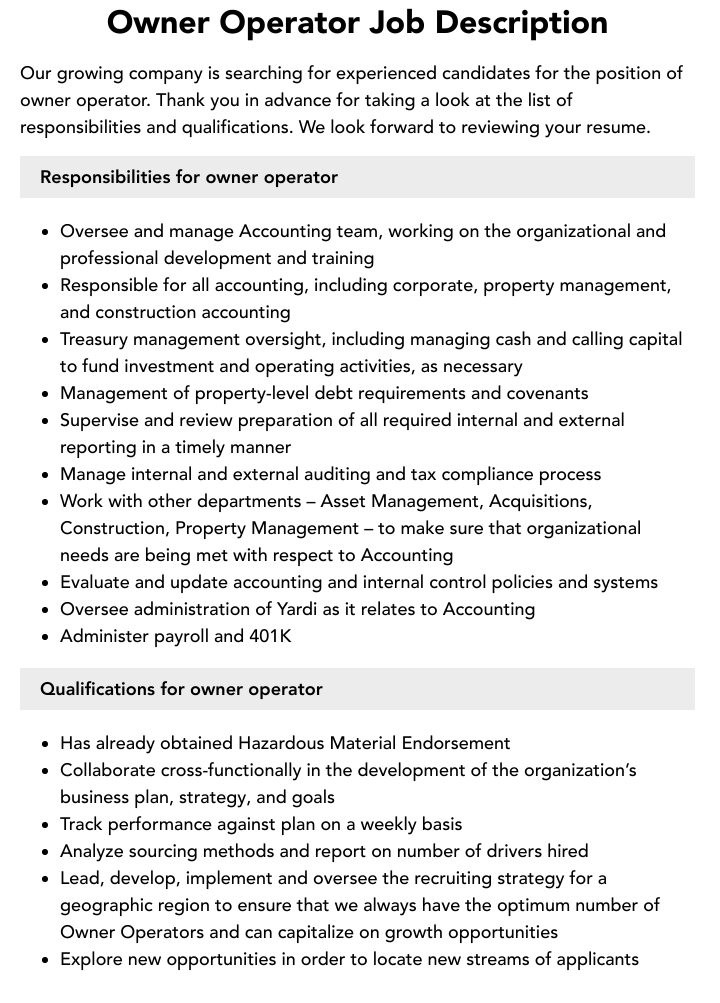Owner-Operator Trucking Jobs: Understanding the Terms of Use
The allure of independence and high earning potential draws many to owner-operator trucking jobs. However, the freedom comes with responsibilities, and understanding the terms of use in your contracts is crucial for success and avoiding costly mistakes. This article breaks down the key aspects of owner-operator agreements, helping you navigate the complexities and make informed decisions.
What is an Owner-Operator Trucker?
An owner-operator trucker owns their own truck and is responsible for all its maintenance and operational costs. They often contract with trucking companies (brokers or shippers) to haul freight, effectively acting as an independent contractor rather than an employee. This independent status offers flexibility but also necessitates a thorough understanding of the legal and financial implications.
Key Terms to Understand in Owner-Operator Contracts:
- Freight Rate: This is the amount you're paid per mile or per load. Negotiating a fair freight rate is vital to profitability. Pay close attention to how this is calculated – is it based on deadhead miles (empty miles), fuel surcharges, or other factors?
- Fuel Surcharge: This is an additional payment to compensate for fluctuating fuel prices. Understand how this surcharge is calculated and if it’s adjusted frequently.
- Deadhead Miles: These are the miles you drive without a load. Contracts should clarify whether you are compensated for these miles, and if so, at what rate.
- Maintenance and Repairs: Who is responsible for repairs and maintenance of your truck? The contract should clearly outline your responsibilities and any potential support from the company. Consider the cost of repairs and downtime when evaluating contracts.
- Insurance: Ensure the contract specifies insurance requirements and who is responsible for what types of coverage (liability, cargo, etc.). Adequate insurance is essential to protect you and your business.
- Dispatch Fees: Some companies charge dispatch fees for finding loads. Understand how this fee is structured and if it’s worth the convenience.
- Payment Terms: Clarify how and when you will be paid. Are payments weekly, bi-weekly, or monthly? What are the penalties for late payments?
- Termination Clause: Review the terms for terminating the contract. Understand the notice period required and any potential penalties.
- Arbitration Clause: Some contracts include arbitration clauses, specifying how disputes will be resolved.
Negotiating Your Contract:
Don't be afraid to negotiate. A strong contract protects your interests. Consider seeking legal counsel to review contracts before signing. Key aspects to negotiate include:
- Higher Freight Rates: Research industry averages to ensure you're receiving a competitive rate.
- Fuel Surcharge Adjustments: Negotiate for frequent adjustments based on market fuel prices.
- Compensation for Deadhead Miles: Aim for compensation that covers your expenses during deadhead travel.
- Clear Maintenance and Repair Responsibilities: Ensure the contract clarifies who is responsible for which repairs.
Finding Reputable Companies:
Choosing the right company is critical. Research potential brokers and shippers thoroughly. Look for companies with a strong reputation, positive reviews, and transparent business practices. Check with the Better Business Bureau and other relevant resources.
The Bottom Line:
Owner-operator trucking can be lucrative, but understanding the terms of use in your contracts is paramount to success. Take the time to thoroughly review each contract, negotiate fair terms, and choose reputable partners. Prioritizing clear communication and a well-defined agreement will protect you financially and legally, allowing you to focus on the road ahead.
Call to Action: Have you had experience negotiating owner-operator contracts? Share your tips and advice in the comments below!

